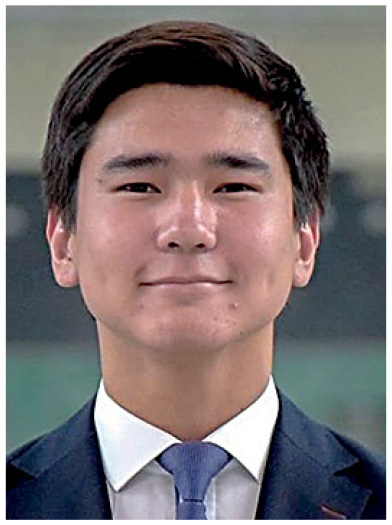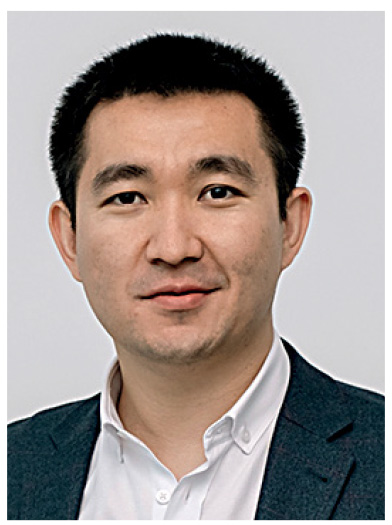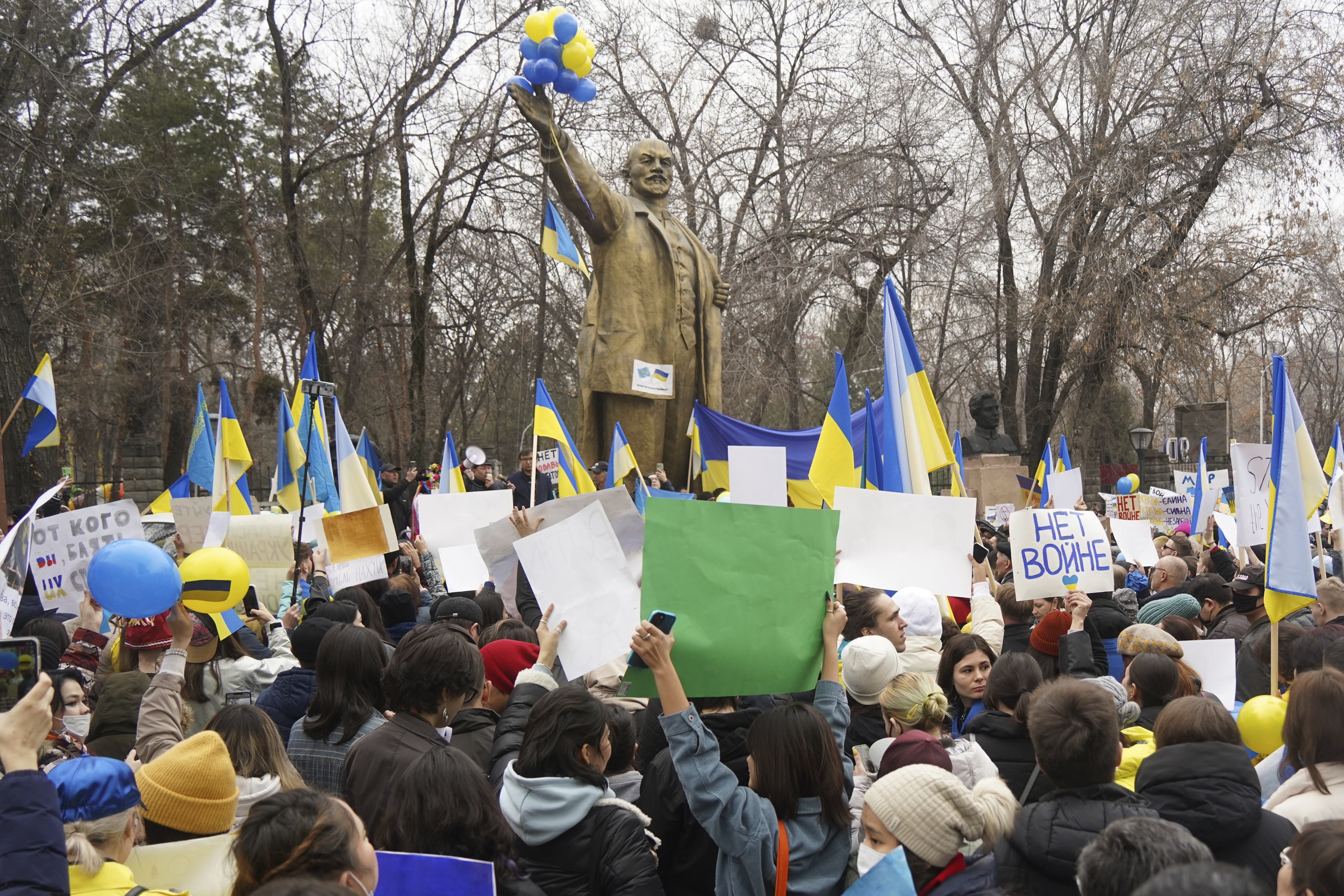 Diyas Takenov is a Research Assistant at the Graduate School of Business at Nazarbayev University.
Diyas Takenov is a Research Assistant at the Graduate School of Business at Nazarbayev University.

Symbat Ibadulla is a graduate student at the Graduate School of Public Policy at Nazarbayev University.

Zhanibek Arynov is an Assistant Professor at the Graduate School of Public Policy at Nazarbayev University in Astana, Kazakhstan. You may follow him on X @ArynovZhanibek.
Describing President Macron’s visit to Kazakhstan in 2023, Bloomberg News referred to the country as “Putin’s backyard.” While this characterization may be an oversimplification by the Western media, it does hold some merit, as Kazakhstan is often perceived as one of Russia’s closest allies. However, since the onset of Russia’s invasion of Ukraine, Kazakhstan has refused to recognize the annexation of Ukrainian territories, provided humanitarian aid to Ukraine, and welcomed thousands of Russians fleeing Russian President Vladimir Putin’s mobilization—actions that hardly align with the notion of a “backyard.” Although Kazakhstan has long been, and largely remains, heavily dependent on Russia both politically and economically, the war in Ukraine has shifted the balance, making Russia more reliant on Kazakhstan than before. This shift in interdependence has granted Kazakhstan greater room to maneuver in its foreign policy. While recent developments in Ukraine and the United States may potentially restore the pre-war balance, popular support for Russia within Kazakhstan has suffered significant damage—an impact that will have long-term consequences for the country and its relationship with its northern neighbor.
Turning Point
In January 2022, Kazakhstan experienced the largest public unrest in its history since gaining independence. To stabilize the situation, President Tokayev officially requested assistance from the Collective Security Treaty Organization (CSTO), a Russia-led security bloc, citing an attack by foreign-backed terrorist groups. For the first time in its history, the CSTO agreed to deploy “peacekeeping forces” to Kazakhstan. Following this intervention, many expected the country to abandon its multi-vector foreign policy and align more closely with Russia. Initially, this expectation seemed to materialize, as President Tokayev rolled out several initiatives aimed at deepening cooperation with Russia on energy technology, education, and culture, while also redirecting his scholarship program to strengthen ties with Russian educational institutions. Overall, there was widespread expectation of a stronger-than-ever Russian influence over Kazakhstan.

Kazakhstanis protest in support of Ukraine in 2022. / Source: Guliver Image
However, Russia’s invasion of Ukraine altered the situation dramatically. With over 3,400 companies and more than 10,000 individuals facing sanctions, Russia was cut off from the SWIFT payment system and supply chains across nearly all sectors of the economy—from automotive manufacturing to aviation and agriculture. Western companies halted virtually all cooperation with Russian enterprises, and major investment projects were either frozen or canceled. Millions of ordinary Russians suddenly found themselves unable to access goods they were accustomed to, or to pay for holidays and international purchases. On the political front, Russia became increasingly isolated, with its leadership facing diplomatic exclusion on the global stage. The situation worsened with the International Criminal Court issuing arrest warrants for President Putin, severely restricting his ability to travel internationally. A particularly humiliating moment occurred when Putin was unable to attend the BRICS summit in South Africa in person despite initial plans, forcing him to participate via video call instead.
In Kazakhstan, the initial disbelief and shock at the unfolding invasion gradually gave way to the realization of emerging opportunities, as Russia faced political isolation and an unprecedented wave of sanctions. Suddenly, the balance in relations between the two countries shifted—while Kazakhstan had been more dependent on Russia before February 2022, it was now Russia that needed Kazakhstan more than ever. Individuals and enterprises in Kazakhstan seized the opportunity by importing sanctioned goods from Europe and reselling them to Russian consumers and companies at significantly higher prices. For instance, the export of mobile phones, which amounted to just over $36,000 in the first half of 2021, skyrocketed to $79.9 million during the same period in 2022.
On a macroeconomic level, Kazakhstan became a key destination for Russian enterprises seeking to circumvent sanctions by registering as Kazakhstani companies in order to maintain their operations with foreign firms. By formally registering in Kazakhstan and obtaining a Business Identification Number for fiscal purposes, these enterprises could effectively continue their activities from Russia, while handling paperwork and taxes through Kazakhstan. This arrangement allowed Western companies to claim they were doing business with Kazakhstani, rather than Russian entities. Alongside a few other countries in the region, Kazakhstan also emerged as a crucial gateway to the global economy for an increasingly isolated Russia. As Western nations severed Russia’s access to SWIFT and cut off critical supply chains, Russian citizens faced numerous challenges—ranging from an inability to transfer money internationally to shortages of essential goods such as medicines, as well as less critical items like clothing. In this context, Kazakhstan provided a convenient and accessible lifeline, enabling Russians to travel there to purchase medicines, open bank accounts, and obtain necessary supplies. In 2022, financial transactions from Russia to Kazakhstan reached a record high of over $686 million—almost seven times the total transactions between the two countries in 2021.
Overall, Kazakhstan’s importance to Russia surged to an unprecedented level. This shift in balance granted Kazakhstan’s government greater flexibility in its foreign policy, allowing it to distance itself from Moscow. Perhaps the most notable example of this newfound autonomy was President Tokayev’s statement—delivered in Putin’s presence—declaring that Kazakhstan does not recognize the annexation of Crimea or the so-called “quasi-state” entities established by Russia in Donetsk and Luhansk. Furthermore, Kazakhstan sent 82 tons of medical supplies as humanitarian aid to Ukraine, and President Tokayev engaged in direct talks with Ukrainian President Zelensky. In a country known for rarely sanctioning public gatherings with political messages, the government unexpectedly permitted several protests in Almaty and Astana against the invasion. In contrast, individuals displaying pro-war symbols such as the letters “Z” and “V” on their vehicles were subjected to police questioning.
In addition, Kazakhstan accepted hundreds of thousands of Russians fleeing the mobilization announced in September 2022. Unwilling to join the Russian army, many fled alone or with their families, often in haste and without proper travel documents. President Tokayev stated that they were escaping hopeless situations and should be taken care of. The government even expanded the number of state service centers in Astana to accommodate the increased demand from incoming Russians.
Popular Response to the Invasion
Growing support for Ukraine became increasingly visible within Kazakh society. The direct attack on a sovereign state deeply shocked Kazakhstanis, prompting many to reconsider their perception of Russia. Public discussions resurfaced previous remarks by Russian public figures asserting that northern Kazakhstan historically belongs to Russia, intensifying existing concerns. This narrative made it easy for Kazakhstanis to imagine themselves in Ukraine’s position, amplifying their emotional response to the conflict. For many years, Russia had enjoyed a positive image among most Kazakh citizens, seen as a powerful neighbor and a longstanding partner. According to surveys, 87 percent of Kazakhstan’s citizens expressed a favorable view of Russia, reflecting strong historical ties and cultural proximity. However, the events following February 2022 marked a turning point, leading to a profound reassessment of Russia’s role and image among the population.
With the onset of military actions in Ukraine, Kazakh society faced a dilemma: whether to support a longstanding ally or condemn aggression. Initial public opinion polls indicated that only 10 percent of Kazakhstanis supported Ukraine, while 39 percent were inclined to back Russia. However, within the first months of the conflict, differences in opinion across social groups became increasingly apparent. Kazakh-speaking citizens were more likely to express sympathy for Ukraine, whereas Russian-speaking citizens tended to support Russia or adopt a neutral stance. Over time, shifts in public perception grew more pronounced. By December 2022, support for Ukraine had doubled to 22 percent, while support for Russia had declined to 13 percent. This transformation in public opinion underscored a growing awareness of the threat Russia posed to Kazakhstan.
One of the factors that heightened public sensitivity was the mass relocation of Russians to Kazakhstan. Following the announcement of mobilization in the fall of 2022, thousands of Russians fled their country to avoid being sent to war, with Kazakhstan emerging as one of their primary destinations. This influx significantly altered the social atmosphere in the country. The arrival of so many migrants sparked mixed reactions—on the one hand, Kazakhstanis displayed sympathy and hospitality, welcoming those seeking refuge from the war. On the other hand, the sudden surge in migration led to increased social tensions, particularly in major cities. Housing rental prices soared, and concerns grew over potential shifts in the cultural and demographic balance. Furthermore, many newcomers did not actively seek to integrate into Kazakh society, adding to the complexities of the situation.
The escalation of the conflict in Ukraine also triggered a wave of anti-war protests across Kazakhstan. One of the largest protests took place in Almaty, drawing around 5,000 people who condemned Russian aggression and voiced support for Ukraine. Protesters held banners with slogans such as “Putin, The Hague, Prison!” and “Kazakhstan will be next if the war is not stopped now.” These messages not only denounced Russia’s actions but also reflected deep-rooted fears among Kazakhstanis about their country’s future. Similar protests were held in the capital, and many citizens took to social media to express their opposition to the war.
The protests became more than just a platform for expressing anti-war sentiments; they played a crucial role in the broader reassessment of national identity. Russia’s invasion of Ukraine reignited discussions about decolonization, prompting Kazakh society to critically evaluate its colonial past and Russia’s influence on domestic affairs. This period saw a surge of interest in the Kazakh language and culture, particularly among the youth. Even many Russian-speaking citizens began actively learning Kazakh, recognizing its importance in shaping national identity and asserting independence. Ultimately, this period proved pivotal in strengthening Kazakhstan’s national identity and cultural self-determination.
At the same time, Kazakhstanis actively self-organized to provide humanitarian aid to Ukraine. Businessmen and public figures initiated the installations of the “Yurt of Invincibility” in affected cities, offering locals a place to warm up, charge their phones, and enjoy Kazakh national dishes. In just one year, these yurts in Kyiv alone welcomed over 100,000 visitors. Additionally, humanitarian aid shipments—including food, medicine, and vehicles such as pickup trucks—were sent to Ukraine. As Russia relentlessly targeted Ukraine’s power grid, Kazakh businesspeople responded by sending over 20 mobile power generators to Ukrainian hospitals. Furthermore, donations from ordinary Kazakhstanis helped equip several Ukrainian schools with bomb shelters, enabling 4,000 children to continue their education despite the war. The scale of Kazakhstan’s support did not go unnoticed, with the Ukrainian president publicly acknowledging and praising the efforts of Kazakh people and businesses in supporting Ukraine.
Perhaps the strongest grassroots-level condemnation of the war came in the form of widespread rejection of its symbols. As previously mentioned, the government fined individuals displaying the “Z” and “V” symbols in public, but it was ordinary Kazakhstanis who actively reported such instances to the police and on social media. Numerous incidents were captured on camera, with individuals displaying these symbols being reported online, often prompting swift action from law enforcement. Even several Russian citizens arriving in Kazakhstan with these markings on their cars faced similar scrutiny and intervention.
Overall, Russia’s invasion of Ukraine and growing fears of potential Russian aggression against Kazakhstan, has fueled anti-Russian sentiments and significantly eroded Russia’s longstanding positive image in the country.
Back to the Future?
However, it appears that Kazakhstan’s expanded room for maneuver is steadily shrinking under increasing pressure from Russia, prompting the government to readjust its course. For instance, while Kazakh officials had previously assured their Western counterparts of their commitment to sanctions compliance, Deputy Prime Minister Serik Zhumangarin stated in December 2024 that while Kazakhstan will not help Russia circumvent Western sanctions, the country “will not blindly follow” them either, especially if they conflict with national interests, as certain sanctioned goods sustain entire industries and single-industry towns. Framing this within President Tokayev’s statement that Russia is militarily invincible provides insight into the political calculations of Kazakhstan’s leadership. The ongoing stalemate in Ukraine and the results of the U.S. presidential election suggest that the Kremlin is unlikely to lose the war anytime soon, and the prospect of a truce—along with Russia’s return to the international stage—no longer seems as unimaginable as it did two years ago. Furthermore, a recent prank call in which former British Foreign Secretary David Cameron was tricked into believing he was speaking with former Ukrainian President Poroshenko revealed that Kazakhstan’s foreign minister allegedly believed that northern Kazakhstan might be Russia’s next target. These factors suggest that security concerns are weighing heavily on Kazakhstan’s leadership, forcing the government to carefully calibrate its actions in response to the shifting political landscape.
Perhaps the most significant example of Kazakhstan’s recalibration is the proposed construction of a nuclear power plant—an old Russian proposition that President Putin has put forward multiple times over the years. Kazakhstan held a referendum on the issue in October 2024, and shortly after the results were announced, the Russian embassy in Astana requested a meeting with President Tokayev and Rosatom representatives to discuss the project’s prospects. To ensure accuracy, it is important to note that Kazakhstan has also received increased interest from other parties, including China and France. While President Tokayev has previously expressed support for the idea of an international consortium overseeing the plant’s construction, it is undeniable that Rosatom—with its control over a quarter of Kazakhstan’s uranium production and strong political backing from the Kremlin—will likely play a significant role, if not serve as the sole constructor.
Beyond the power plant, the previously tolerated opposition to Russia’s invasion appears to have been curtailed. Several requests to hold gatherings in support of Ukraine in major Kazakh cities have been denied by authorities, citing various reasons. Actions that might be perceived as hostile to Moscow or its policies are increasingly being suppressed. For instance, a Kazakhstani Orthodox priest who openly opposed the war in Ukraine and criticized the Russian Orthodox Church (ROC) for supporting the invasion was subsequently excommunicated. When he announced plans to establish an independent Kazakhstani Orthodox Church under the jurisdiction of the Ecumenical Patriarchate of Constantinople, he was charged with inciting social strife based on an anonymous report. The priest claims that the ROC orchestrated the charges, and he now faces possible prison time if convicted. This case underscores Moscow’s continued influence in Kazakhstan and the government’s willingness to cooperate with its requests.
While the government may be shifting towards a friendlier stance with Russia, the same cannot be said for ordinary citizens. This is not to suggest that the entire Kazakh society has become hostile towards Russia—indeed, a segment of the population continues to support the invasion and views Russia and its leadership favorably. However, at a broader level, it is evident that Russia no longer enjoys the same positive image it held before February 2022.
On a more specific level, concerns about Russia manifest in various ways. Large-scale cooperation projects, such as the construction of nuclear power plant, have faced strong public opposition. Many citizens perceive the project as a strategic move by Russia to expand its influence in Central Asia, especially given its push for similar projects in Uzbekistan and Kyrgyzstan. Public concerns are not solely focused on nuclear energy itself but on the potential involvement of Rosatom, a Russian state-owned corporation. These concerns stem from fears of geopolitical dependency and a widespread belief that the Kazakh government is inclined to choose Russia for the project despite viable alternatives. The “Russia factor” intensifies these fears, with citizens viewing it as another attempt to consolidate political influence by positioning itself as the primary provider of critical nuclear technologies—raising apprehensions about increased dependency and diminished sovereignty for Kazakhstan.
Against this backdrop, visits by Russian leadership, particularly President Putin, take on heightened significance. Since the start of Russia’s full-scale invasion of Ukraine in 2022, Putin and Kazakh President Kassym-Jomart Tokayev have held 46 meetings, nine of which were in person. However, Putin’s visits since 2022 have increasingly been met with public discontent. Protests and expressions of disagreement have become notable features of the population’s reaction. In addition to these demonstrations, traditional criticism and calls to withdraw from organizations such as the Eurasian Economic Union and the CSTO have gained traction, garnering support from a broader segment of Kazakhstani society. For example, during one of Putin’s visits, activists in Kokshetau were detained for publicly expressing anti-Russian sentiments.
Putin’s most recent visit to Astana sparked significant public backlash. Traditional protocol elements, such as banners reading “Your Excellency, Mr. Vladimir Putin, welcome to Astana!” and the display of Russian flags, were met with a significant degree of public discontent. During the visit, Putin was also presented with a painting titled “Bridge of Friendship” by a Kazakh artist, which drew heavy criticism on social media. Further controversy erupted when a Ukrainian flag briefly appeared on a LED screen at the “Astana Opera” theater, intensifying public debates and underscoring the polarized attitudes toward Russia. The backlash reached such a level that official media were compelled to clarify that state visits require a certain degree of formality and that the title “Your Excellency” is a standard address for visiting heads of state. While this is indeed a customary greeting for foreign dignitaries—Kazakh officials used similar protocols during the visit of China’s president in July 2024—the unprecedented public outcry over Putin’s arrival highlights the deep-seated discontent among the population toward the Russian leader.
Realpolitik & Deep Scars
Looking at the bigger picture, the shift in the government’s approach is neither sudden nor unexpected. Kazakhstan shares the longest uninterrupted land border with Russia and remains deeply intertwined with the Russian economy. Oil transportation routes, a major source of revenue for Kazakhstan’s budget, mostly pass through Russian territory, and both countries are members of the same economic and military unions. These factors, combined with the increasingly hostile rhetoric from certain Russian bloggers and politicians regarding the annexation of northern Kazakhstan, serve as a constant reminder to leaders in Astana of the potential consequences of a fallout with Moscow. Therefore, any Kazakh leadership must maintain a good (or at least nominally good) relationship with Russia. The actions of the current government are simply pragmatic reflections of this belief.
However, while the government operates on a realpolitik basis and can adjust its course in response to shifting power dynamics and interdependence, the sentiments of the Kazakh people are another matter entirely. Horrified by the atrocities of the war, the population has undergone a significant shift in its perception of Russia. No previous event or Western media report has inflicted as much damage on Russia’s reputation as its invasion of Ukraine. Even if Moscow manages to maintain close ties with the government, it has lost the hearts and minds of Kazakhstanis for years to come.
This shift in public sentiment will have far-reaching, albeit unpredictable, consequences for both the government and Russia. Any initiative involving cooperation with Russia will now face heightened levels of distrust and suspicion, potentially hindering the government’s efforts. Within society, existing political divisions—whether pro- or anti-government, liberal or conservative, religious or secular—will be further complicated by attitudes toward Russia, which could significantly reshape Kazakhstan’s political landscape in the future.
Of course, it remains difficult to predict the trajectory of relations between Russia and Kazakhstan. Much will depend on the future leadership in the Kremlin and the broader consequences Russia faces in the aftermath of the war. However, one thing is certain—the invasion has left a deep scar on the relationship between the two nations at the grassroots level, with repercussions that will extend beyond the tenure of any government in the Kremlin or the Aqorda.







